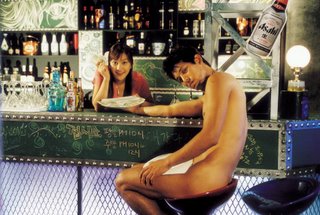If you are not a fan of off-beat Korean movies such as
Mi in (La Belle) or
Memories of Murder for example, you might not understand why I hate the FTA, and what it does. You might be inclined to skip this article entirely.
I think you should put yourself in the shoes of the great indie producers and directors of Korea.
Did you see
Fargo? If you did, be aware that it was put before you by the Cohn Brothers; a pair of mavericks who gave America one of it's best and most memorable films. The Cohn Brothers were indie producers on a shoestring budget, who gathered a cast of brilliant actors interested in the art form over the money.
Would you have wanted to miss
Fargo? You might have if big studios made it impossible for such works to get a remotely fair shake. The FTA will not give the indies a fair shake. It will kill some of the most entertaining film out there.
Much of the work coming from Korea these days infinitely eclipses the average garbage America puts on the screen.
FTA Effect On Korean Cinema"When the recent screen quota reduction cut the number of days which Korean movies could be shown in theaters from 146 to 73, critics and supporters alike turned raucous over its possible effects on the local film industry. There has been little talk, however, over its possible deleterious implications on low- to mid-budget independent art films.
For those who find themselves agreeing with Andre Bazins old Cinema du Cahiers crowd that cinema really is an art form, or those who seek a little more from movies than the passive viewing of the same overused formulas, the screen quota reduction could signal a larger problem than the United States vs. Korea cultural battle.
Korea is currently undergoing what some critics call a renaissance in cinema. During the latter half of the 1990s, Korean cinema entered a remarkable boom.
Commercial filmmakers such as Chang Yoon-hyun and Kang Je-gyu made their debuts alongside arthouse directors like Kim Ki-duk and Hong Sang-soo. Since then, Korean movies have not only done well at home, but have also garnered international attention, bringing home numerous awards from the international film circuit.
Supporters of the screen quota reduction argue that a more open market in Korea will intensify competition and raise the quality of local fims in the long run. That is assuming, however, that quality is simplistically pegged to market forces and economic success.
Hollywood will continue what it does best - mercilessly making and distributing the same tired formula. To compete with the general fare, Korea will be forced to adopt Hollywood blockbuster models - not just in movie content but in distribution and production practices as well.(emphasis mine)
Korean
blockbusters may still be able to compete with major Hollywood films in terms of market share.
The real losers are likely to be independent films or low-budget films that - prior to the screen quota reduction - already existed on the margins, and screened in small arthouse theaters.(emphasis mine)
Why take the risk of investing in movies that have an unsure future, when theaters can invest in Hollywood blockbusters that aggressive marketing alone can often ensure profit?
The reduction of the screen quota will invite every major Hollywood distributor into Korea, and if Hollywood dominates other international markets as well, such blockbuster successes are not the only things Korean filmmakers need to worry about.
Though illegal in the United States, companies often add a handful of extra movies (even third-rate ones that go straight to DVD in the United States) into a package deal when a theater signs up for a major movie. Korea should prepare for every throwaway prequel, sequel, and sequel to the sequel, etc. that Hollywood can muster.
Though Korean distribution giants may hold their own, block-booking, as the practice is known, will effectively bump smaller independent distributors out of the picture.
Take, for example, the case of international film festival regular Kim Ki-duk, who, though largely unsuccessful in Korea, has helped make a name for Korean cinema around the world, winning prizes at numerous film festivals.
A recognized auteur of cinema, the question is not whether Kim will be able to compete with an increased number of Hollywood movies in Korea; he already didnt stand a chance against the high-budget Korean films prior to the reduction.
The screen quota, Kim himself argues, is precisely what gave him and other low budget filmmakers a chance to survive.
The screen quota allowed production companies to roll out films with marginal box office power since they had to be screened for a certain period. Hollywoods permanent vacation in Korea will mean that production companies will not even begin to produce these films.
New investments henceforth will translate to higher returns for companies at the expense of low-budget films. Distributors and producers alike are set to benefit, when their combined investments are attuned to box-office appeal.
Not to say that low-budget or independent films are synonymous with the artistic; often they are just as empty of meaning as their big money counterparts. But they thrived in a system that allowed diversity, from which cinematic gems such as Kim Ki-duk emerged.
With little chance of an outlet, a whole sector of Korean film faces extinction. A high market share does not signify a healthy national cinema;
Korea must maintain and further develop the independent undercurrent art scene which, though largely unseen, prevents the artistic stagnation of the national industry.(emphasis mine)
As arthouse theaters that play primarily non-Korean films are likely to benefit from the reduction, Korean cinephiles may be reduced to watching the latest David Lynch picture, wondering what could have been."
By Chris RoThe Korea Herald2006.07.12








